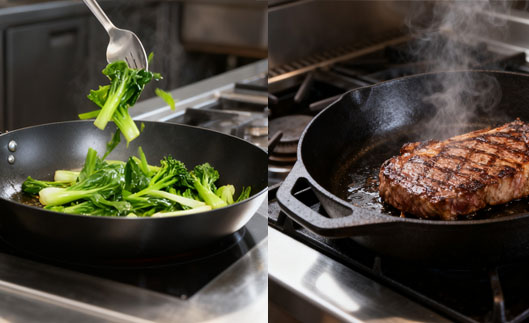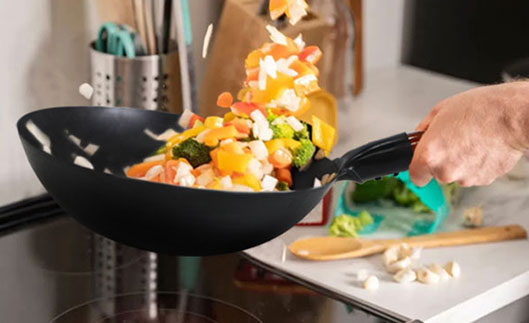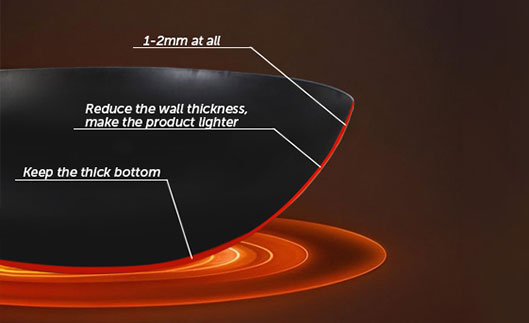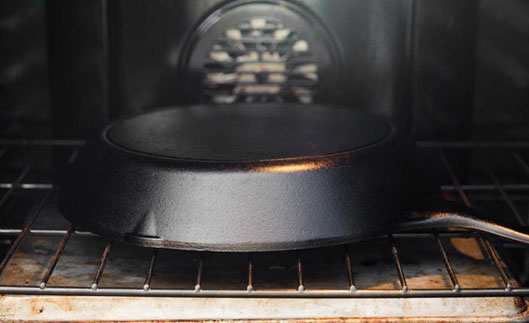
When equipping your commercial kitchen with cookware, every decision involves efficiency, cost, and quality. Carbon steel and cast iron represent two formidable peaks in the pursuit of durability and superior performance. Both are highly regarded by professional chefs, but which is the smarter, more profitable investment for your kitchen?
This article will provide an in-depth comparison of the two from a business investment perspective to help you make the best purchasing decision.
Round One: Heating Performance and Response Speed
Carbon Steel: Wins in Speed and Evenness. Carbon steel cookware is generally lighter and thinner than cast iron, meaning it responds extremely quickly to changes in flame. Heat is distributed rapidly and evenly across the cooking surface, ideal for dishes requiring quick tossing and precise heat control, such as stir-frying vegetables, frying eggs, or searing steaks. This is an unparalleled advantage during peak order periods.
Cast Iron: Wins in Heat Retention. Cast iron is thick and heavy, heating up more slowly, but once it reaches temperature, it acts like a thermal battery, retaining heat extremely steadily. This is crucial for cooking methods that require long, even heating, such as searing thick-cut steaks (to achieve the perfect Maillard reaction), stewing in the oven, and making large batches of pancakes on a pancake griddle.
Business Insight: If your main business involves stir-frying, deep-frying, or other dishes that require quick service, carbon steel is a more efficient choice. If you need a stable heat source for long periods of grilling or slow cooking, cast iron is irreplaceable.

Round Two: Durability and Lifespan
Both are "heirloom" quality. Whether carbon steel or high-quality cast iron, their lifespan far exceeds that of any coated nonstick pan. With professional care, they can last for decades.
Toughness Comparison: Carbon steel has a certain degree of toughness and can withstand a certain level of impact. Cast iron, on the other hand, is more brittle and may crack or break if dropped from a height or subjected to a violent impact. This is a practical risk to consider in a busy, noisy kitchen environment.
Business Insight: From a purely durability perspective, both are excellent investments. However, in terms of impact resistance, carbon steel is generally better suited to the high-intensity, fast-paced environment of a commercial kitchen.

Round Three: Weight and Handling
Carbon Steel: Significantly lighter. A 12-inch carbon steel skillet can be 30%-50% lighter than a cast iron pan of the same size. This significantly reduces wrist strain and fatigue for chefs who frequently toss and move the pan, directly improving work efficiency and operational flexibility.
Cast Iron: Has a certain weight. Its weight is an advantage (heat retention) but also a disadvantage in terms of operability. Frequently moving heavy cookware is physically demanding for chefs and can increase wear and tear on kitchen surfaces.
Business Insight: For modern commercial kitchens prioritizing speed and efficiency, carbon steel offers significant advantages in ergonomics and operability.

Round Four: Non-stick Properties vs. Maintenance
Similarities: Both rely on a polymer layer formed through seasoning to achieve natural non-stick properties. Both require avoiding harsh cleaning with strong detergents. Seasoning involves applying a thin layer of cooking oil to the surface of the cookware and heating it to form a strong, smooth, and dense polymer film. You can think of it as putting a "non-stick armor" on the pan.
Carbon Steel: Seasons faster and is easier to maintain. Due to its generally smoother surface, the oil film forms faster and more evenly. After routine cleaning, a simple oiling and drying process easily maintains its condition.
Cast iron: The seasoning process takes a bit longer, and if the oil film is damaged due to improper handling (such as cooking acidic foods for too long), re-seasoning requires more patience.
Business Insight: While both require maintenance, the maintenance process for carbon steel is more user-friendly in busy commercial kitchens, making it easier for employees to quickly learn and implement.

Related Reading: How to Maintain Pre-Seasoning Cast Iron Cookware?
Final Verdict: Which is Right for Your Business?
Choose Carbon Steel if your kitchen:
* prioritizes speed of service (e.g., Chinese stir-fry, French grilling).
* requires chefs to frequently toss and move cookware.
* requires rapid heat conduction for precise temperature control.
* desires lightweight yet robust cookware to reduce employee fatigue.
Choose Cast Iron if your kitchen:
* focuses on dishes requiring extreme heat retention and even heating (e.g., thick steaks, slow grilling, baking).
* cookware is primarily used in a fixed location (e.g., grills, ovens), requiring less movement.
* seeks unparalleled "raw" grilling power.
Conclusion: The Wiseest Investment Strategy
For most modern, efficient commercial kitchens, carbon steel offers a more balanced and practical solution in terms of performance, weight, and ease of maintenance. Its rapid heat conduction and lightweight characteristics directly translate into higher service efficiency and lower employee fatigue, meaning a faster return on investment.
However, the ideal kitchen equipment solution is not a simple either/or choice. Many top restaurants have both carbon steel and cast iron cookware in their kitchens, allowing each tool to excel in its area of expertise.
As a professional commercial cookware supplier, we recommend: Use carbon steel frying pans and woks as the mainstays of your kitchen, handling 80% of your daily quick cooking tasks; and also have cast iron skillets and saucepans for handling special dishes requiring extreme heat stability.
Ready to Equip Your Kitchen with the Best?
Sarchi provides a full range of commercial-grade carbon steel and cast iron cookware to food service businesses and distributors worldwide. We offer the most competitive solutions, from OEM/ODM customization to bulk wholesale.
Contact us today for a free product catalog and wholesale quote!
Copyright © Shijiazhuang Sarchi Trade Co., Ltd. All Rights Reserved. |
Sitemap | Powered by 